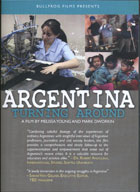
Argentina: Turning Around 2007
Distributed by Bullfrog Films, PO Box 149, Oley, PA 19547; 800-543-FROG (3764)
Produced by Moving Images
Directed by Mark Dworkin and Melissa Young
DVD, color, 37 min.
Sr. High - Adult
Social Justice, Democracy, Bureaucracy, Economics, Globalization, Latin American Studies
Date Entered: 11/21/2008
Reviewed by Malcolm L. Rigsby, Department of Sociology, Ouachita Baptist University, Arkadelphia, ARAn inspiration to all who seek to begin and carry out grass root movements of all kinds!
This documentary is a must see for all who are seeking to learn more about the role of capitalism and development of society, especially the role of workers in a capitalistic setting. After the mid 1980s fall of the Argentinean dictatorship, Argentina experienced a period of international finance, and economic globalization that suppressed much of the population. The false economy benefited only a small percent of the population. By the 1990s crime began to rise as millions lost jobs in factories. In rural areas farmers lost land to major global projects backed by the government.
The documentary readily sponsors that when government fails the people can provide an adequate and productive response by taking control of their own destiny. As bankrupt companies closed doors the workers formed first in isolated groups to re-enter the factories, revitalize machinery, obtain raw goods and resume production. In time, these small groups formed cooperatives that in association provide the necessary connections with suppliers, mechanics, technology workers, and buyers. Some coop companies have made profits. However, in most instances reported the profits have only been sufficient to meet worker and family needs. The documentary optimistically depicts the basic premise “people do have jobs and now are able to feed their families.
An intriguing statement by one individual interviewed in the documentary is “capitalism leads you (individuals added for clarity) to believe failure is in yourself—your own fault.”
There is a particular element to consider in viewing this documentary. Can co-op worker led manufacturing exceed to the level of capital gains, or is it only a means to meet the ends for each pay period? The documentary is earnest in its desire to motivate people to take control of their destiny when government fails, however it realistically notes that so far these co-ops have only been able to provide workers with the essentials of life.
The documentary provides time to those who find this system untenable. Thereby, the viewer gains exposure to both sides of the issue. Even with the data, real life interviews with co-op workers and the use of legal process to achieve their goals of obtaining work the viewer may be faced with a very real question of importance consequence, “Will inequalities be lessened or increased?” Will there be greater distribution of income? Will the co-op system strengthen class status lines? In short, will it really be a better world?
The website for this video listed that PDF resource materials are available. However, the resources could not be located online. Making clear whether resources come with the purchase of the DVD or whether they are readily downloadable online would assist educators and those wishing to view the documentary.
Questions of interest for discussion:
- Can the workers provide the necessary solidarity to go beyond that specific to their own personal and family interests?
- If not, is this no more than a socialized tribal assembly?
- The documentary notes that as some groups attain goals of jobs they fail to continue to support others who are still seeking jobs. The farmers and farm laborers exemplify abandonment after the middle class began to work again. How does this affect the potential for worker led co-ops to exist without true capitalism?
- Can co-op manufacturing exist with capitalism, and if so, does it hinder growth of the overall society in terms of access to public works and social programs?